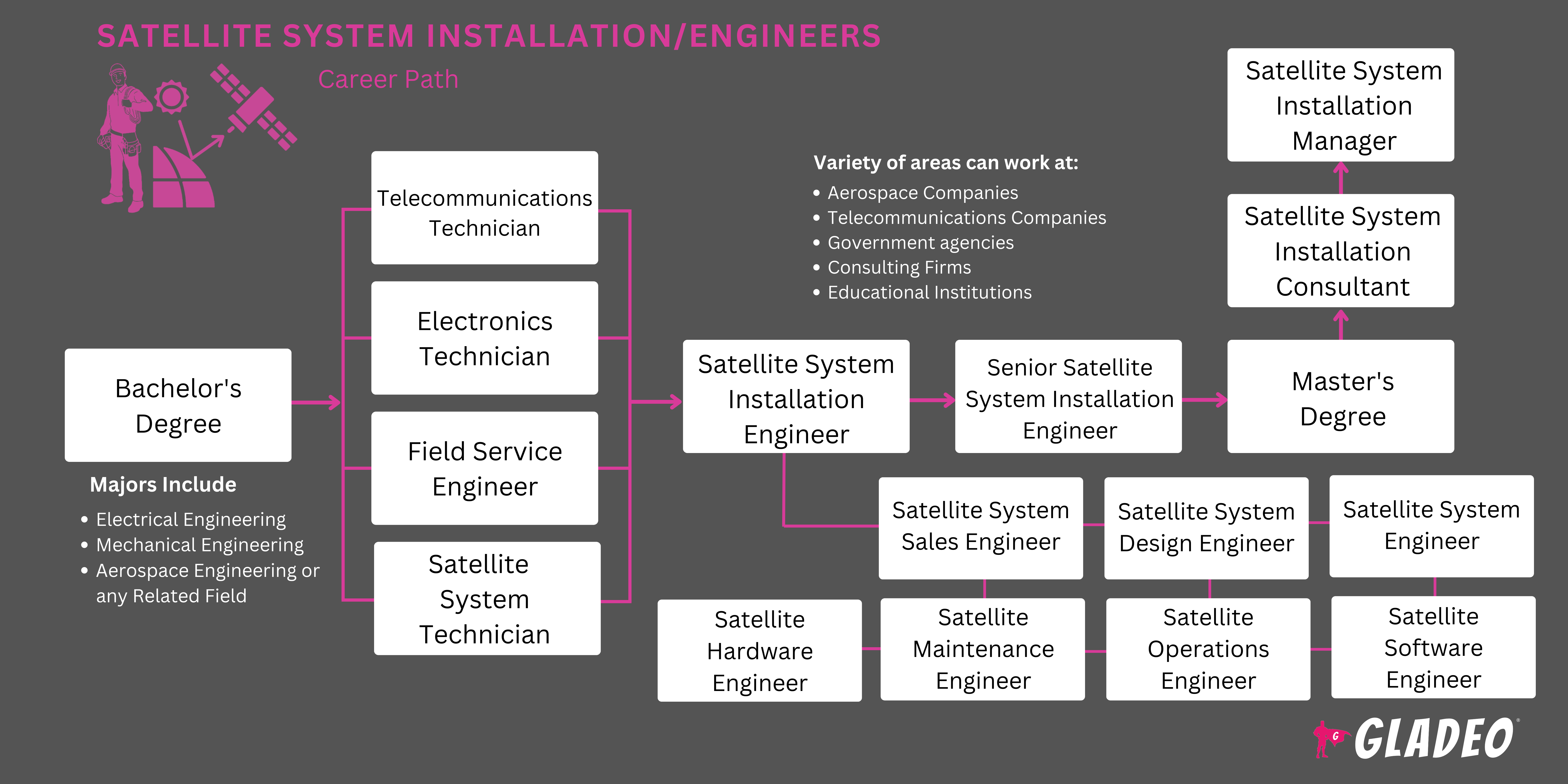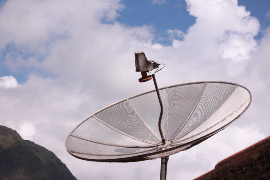聚光灯
Satellite Communications Engineer, Satellite Systems Technician, Satellite Network Engineer, Satellite Ground Systems Engineer, Satellite Operations Engineer, Satellite Systems Integration Engineer, Satellite Antenna Engineer
The modern world relies on satellite technologies to provide TV, phone, internet, and radio communications, as well as for GPS, weather forecasting, mapping, and space exploration. But satellites are only one part of a larger complex system that includes ground stations, control systems, and communications links.
Satellite Systems Engineers are the key players who create, install, and manage these interconnected systems, combining telecommunications, computer science, and aerospace engineering principles in the process. They are also responsible for setting up satellite equipment, aligning and calibrating satellite dishes, and ensuring that data transmission is both efficient and secure.
Their high-tech work is crucial for thousands of commercial, governmental, and exploratory projects designed to keep the world better connected and protected!
- Working with cutting-edge satellite systems
- Enhancing communication and data transmission capabilities
- Contributing to the advancement of global satellite infrastructure
工作日程
Satellite Systems Engineers typically work full-time, with occasional overtime during critical project phases. The role may require travel for site installations, testing, and maintenance.
典型职责
- Design, develop, and maintain satellite subsystems, including communication, power, and propulsion systems
- Collaborate with scientists, engineers, and designers to optimize system design and develop experiments and payloads
- Install and configure satellite dishes and equipment for operational needs
- Conduct evaluations and quality assurance tests to ensure optimal function and reliable data transmission
- Perform orbital analysis and mission planning
- Participate in site surveys and installation planning
- Monitor and update satellite systems and equipment to ensure continuous service
- Provide technical support and training related to satellite systems
- Manage database systems, develop software for satellite operations, and use network protocols
- Prepare detailed reports and recommendations on system performance
- Stay updated on advancements to continuously improve operational efficiency
- Oversee process automation, resolve network operation problems, and manage quality improvement processes
额外责任
- Perform environmental tests on satellite components for space condition resilience
- Manage and allocate frequencies for satellite communication
- Work with international regulatory bodies for satellite licensing and compliance
- Engage in research and development for new satellite technologies and methods
- Plan and execute satellite decommissioning and end-of-life procedures
软技能
- 适应性
- 分析性思维
- 注重细节
- 清晰的沟通
- 创造性
- 独立性
- 创新
- 领导人
- 解决问题
- 自我激励
- 团队合作
技术技能
- Proficiency in satellite systems and components
- Knowledge of radio frequency engineering
- Experience with satellite dish alignment and calibration
- Familiarity with signal processing and data transmission
- Understanding of telecommunications principles
- Skills in software relevant to satellite system installation and maintenance
- Orbital mechanics and space environment
- Skills in system integration and comprehensive testing
- Proficiency in programming languages (such as C++, Python, or MATLAB)
- 航空航天公司
- Broadcasting corporations
- Government agencies (defense, space, etc.)
- Maritime and aviation industries
- 研发机构
- Satellite service providers
- 电信公司
Satellite Systems Installation Engineers may work at heights, in various weather conditions, and at remote locations. It can be a physically demanding job with irregular hours, at times.
They must possess a deep understanding of orbital mechanics and the space environment to navigate and maintain satellites effectively. They should also be skilled in the integration and comprehensive testing of satellite systems, ensuring components function cohesively and efficiently.
Additionally, these engineers have to be proficient in programming languages to develop, maintain, and upgrade software systems to control satellite operations and process data.
One significant trend is the growing deployment of SmallSats and CubeSats—smaller, more affordable satellites with efficiency advantages over larger units.
The utilization of Low-Earth Orbit for these SmallSat constellations helps to reduce latency, making communications better for applications needing high bandwidth. Further driving this evolution is the advent of reusable rocket launch technology, exemplified by SpaceX’s Falcon 9.
Satellites are also finding a complementary role in developing 5G networks, particularly in providing backhaul services in remote areas. Meanwhile, the Internet of Things is using satellites to connect devices in regions beyond the reach of terrestrial networks! Other advancements include beamforming, Non-Geostationary Orbit satellites, Software-Defined Networking, and High-Throughput Satellites!
In their younger years, Satellite Systems Engineers may have been intrigued by space and astronomy, reading about space missions and astronauts or using telescopes to scan the skies. Their curiosity likely extended to STEM subjects, with hobbies such as building model rockets and participating in science clubs. They might have been science fiction fans, too!
- Satellite Systems Installation Engineers typically need a bachelor’s degree in electrical engineering, telecommunications, or aerospace engineering
- Depending on the major, relevant coursework may include:
- Antenna Theory
- Computer Programming (e.g., Python, C++)
- 数字信号处理
- Electronics and Circuit Design
- RF Engineering
- Satellite Communications
- Telecommunications Systems
- Internships in telecommunications or aerospace companies can provide practical experience
- Certifications include options like IS4’s Certified Space Security Specialist Professional
- 拥有工程学学位的人可以继续参加工程学基础考试,获得美国国家工程与测量考试委员会的培训工程师认证,以及美国国家专业工程师协会的专业工程师执照。
- Seek an ABET-accredited program in electrical engineering, telecommunications, or aerospace engineering
- 将学费成本与现有的经济援助和奖学金机会进行权衡
- 决定课程形式(校内课程、在线课程或混合课程)
- 评估教师资格和现代化实验室与研究空间设施
- 调查与行业/研究机构的伙伴关系,以丰富学习经验
- 考虑毕业后的成果,如就业率和校友网络的实力
- Ask a seasoned Satellite Systems Engineer to do an informational interview so you can ask questions!
- Watch videos and read blogs related to the career field to familiarize yourself with current trends and technologies
- Read the job descriptions for jobs posted on employment portals like Indeed.com to see what the most current qualifications are
- In high school, load up on math (algebra, geometry, pre-calculus, calculus), statistics, computer science or programming languages, physics, chemistry, astronomy, electronics, robotics, computer-aided drafting, and English composition
- Study programming languages like Python and C++
- Continue your studies in college to learn about satellite communications (SATCOM)
- Engage in extracurricular activities such as computer clubs to learn and gain soft skills
- Participate in science fairs to showcase your skills; join SATCOM forums and discussion groups
- Apply for internships to gain first-hand knowledge of the field
- Start a working resume so you can keep track of work and academic accomplishments

- Look for internships in satellite technology to get your foot in the door
- Review Satellite Systems Engineer resume templates and sample interview questions
- Upload your resume to job portals like Indeed.com and include keywords such as Satellite Installation, RF Engineering, Telecommunications, Antenna Calibration, Digital Signal Processing, and other relevant terms and phrases
- Network with SATCOM professionals at conferences and seminars. Let them know you’re looking for work!
- Create a professional LinkedIn account and reach out to potential connections
- Prepare for interviews by brushing up on SATCOM industry news and terminology
- Research potential employers and check their career pages for openings
- Ask former supervisors or teachers if they’ll serve as references or write recommendation letters
- Talk with your university’s career center to get help writing resumes and doing mock interviews
- 面试时穿着专业
- Speak with your supervisor about advancement opportunities
- Let your employer know you are willing to knock out additional education and training that will benefit them
- Build solid, trusting relationships with co-workers, management, and clients
- Keep your skills sharp by learning the latest software and methodologies
- 承担具有挑战性的项目,展示你的能力和多才多艺
- Consider earning a master’s degree or a specialized certification to advance your expertise
- Areas of specialization include satellite systems design, antenna engineering, RF communication, and satellite network security
- Get your Professional Engineer license, if applicable
- Grow your reputation and your professional network through industry associations and conferences
- Contribute to industry journals or publications to showcase expertise and establish thought leadership
- Take on mentoring roles for junior colleagues or interns to develop leadership skills
- 寻求反馈意见,以促进个人和专业的持续发展
网站
- 美国航空和航天学会
- ASC Signal Corporation
- Astranis Space Technologies
- Commercial Remote Sensing Regulatory Affairs
- Comtech Telecom
- CPI Satcom & Antenna Technologies Inc.
- DataPath
- 能源部
- EchoStar
- 美国联邦航空管理局
- 联邦通信委员会
- General Dynamics Corp
- Globalstar
- Hughes Network Systems
- 电气与电子工程师学会
- INTEGRASYS
- Intelsat
- International Telecommunication Union
- ITC Global
- Kymeta
- Kythera Space Solutions
- L3Harris
- Maxar Technologies
- Microcom Communications
- National Aeronautics and Space Administration (NASA)
- 全国广播公司协会
- National Environmental Satellite, Data, and Information Service
- National Oceanic and Atmospheric Administration (NOAA)
- National Telecommunications and Information Administration
- Office of Emerging Security Challenges
- Office of Space and Advanced Technology
- Office of Space Commerce
- Optimal Satcom
- Satcom Direct
- Satellite Industry Association
- Society of Satellite Professionals International
- Space Micro
- ST Engineering iDirect
- Stitel Networks
- TEKEVER
- U.S. Space Force
- Via Satellite
书籍
- Satellite Communications Payload and System, by Teresa Braun and Walter Braun
- Satellite Communications Systems: Systems, Techniques, and Technology, by Gerard Maral et. al.
- Satellite Communications Systems Engineering: Atmospheric Effects, Satellite Link Design and System Performance, by Louis J. Ippolito Jr.
Satellite Systems Engineering is a highly specialized field, but the skills acquired can be applicable in various other areas of technology and engineering. Here are some alternative career paths to consider, such as aerospace engineering, telecommunications engineering, and more. Other related jobs include:
- Aerospace Technician
- Broadcast Engineer
- 化学工程师
- 土木工程师
- 计算机硬件工程师
- 电气与电子工程师
- 工业工程师
- 材料工程师
- 机械工程师
- 核工程师
- RF Engineer
- 软件开发人员
- Systems Engineer
新闻联播

特色工作

在线课程和工具








